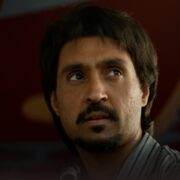BIG VOICE Director Varda Bar-Kar On Creativity, The Wisdom Of Teenagers And Women In The Film Industry
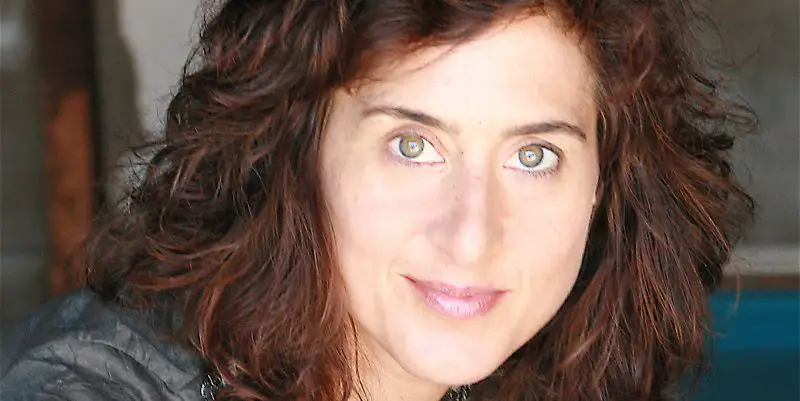
Becky spends her days working in TV and she spends…
Varda Bar-Kar’s latest documentary Big Voice follows the lives of a Santa Monica school choir over the course of a year, under the instruction of their inspirational yet no-nonsense teacher. Mr Huls, teacher extraordinaire, is an intriguing character – full of passion and with motivation to make the choir bigger and better than ever before. Whilst Mr Huls is certainly the driving force in the documentary, it is Bar-Kar’s interviews with the students which are arguably most interesting. From high school sweethearts, to tragedy within a family, to overburdened workloads, the students are highly intelligent, articulate and they flourish under Jeffe Huls’ mentorship.
I caught up with Varda Bar-Kar to talk a little more about why she wanted to make this documentary, how she stumbled across these characters and why it is that that women seem to be leveling the playing field in the documentary industry.
Becky Kukla for Film Inquiry: What was it about the Santa Monica school choir that captivated you so much that you decided to make a documentary about them?
Varda Bar-Kar: I had two daughters in the Santa Monica school system, although neither of them were in high school when we attended a choir concert directed by Santa Monica high school choir director Jeffe Huls. I was amazed by the exquisite choral music and felt transported. I wanted to know how Mr. Huls was able to achieve such artistry with his students singing some music composed as far back as the 13th Century. How was he able to inspire them to take such complete ownership of the music?
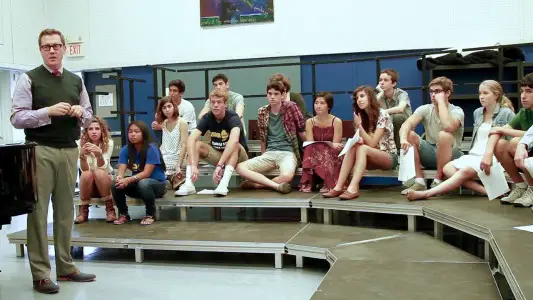
My curiosity stayed with me. I continued to attend his concerts and came to realize that not only is Mr. Huls an amazingly dedicated teacher, he is also quite charismatic. It occurred to me that he would be a strong subject for a documentary. I remember, I was in the kitchen cooking letting my mind wonder. I thought to myself, “if I could make any film in the world, what would that film be.” My answer was, “Mr. Huls and his choir.”
FI: One of the most astonishing things about Big Voice is the amount of access you have to both Mr Huls and the students – we see almost a complete year of their lives within the choir. How did you negotiate such intimate access?
VBK: I am a strong supporter of arts education and a few years back when there was a state funding crisis I stepped up along with a determined group of parents and public school supporters to help The Santa Monica Malibu Education Foundation raise $1.5M in six weeks to save art teachers, librarians, nurses, etc… I made a PSA and arranged for fundraising screenings of preview movies. I had demonstrated that I could be trusted and that I am sincere in my efforts. In a nutshell, this made it possible for the production to have such amazing access.
Mr. Huls and the choir were very busy throughout the year. While I respected everyone’s busy schedule, I remained undeterred and persevered for a year and half to make sure that we had complete story arcs for all our main characters and for the choir story as a whole. When I interviewed the students and Mr. Huls, I made sure to treat them with the utmost respect and to truly listen to their stories and insights.
FI: You mentioned you are an avid supporter of arts education, and it’s clear from watching Big Voice that the documentary can be read as an advocate for why arts education is important. Was it always your intention to show how important creativity and the arts are?
VBK: I thought long and hard about how to distill these ideas about it [creativity]. What is interesting is that words almost don’t do it justice – you have to experience it. Finally, what I arrived at is what they say in some martial arts and in many Eastern philosophies: you have three aspects of being human. The mind, the body, the spirit. These all need to be nurtured in order to be complete, in order to be wholly healthy.
In my mind, the spirit represents the arts. I think that’s why the arts are important…First of all they stimulate the students to think outside of their comfort zone. In this case [the choir], it’s how they use their voice and how they express it – but they have to come up with an expression that comes from their inner selves, one that can’t be taught to them. It’s not like numbers or grammar, it’s something that they have to source within themselves. It’s something that they might not understand is available to them. That is creativity.
This is particularly apparent when Mr Huls talks about how teenagers always want to break the rules. You want to come in late etc etc, but when it comes to the music, you feel like you have to follow the rules. It’s the half note; you hit it at the half note. I want you to break the rules, in this case. What he says to them is be creative. I want you to find that expression of how it sounds, outside of any rules or regulations. Transcend that.
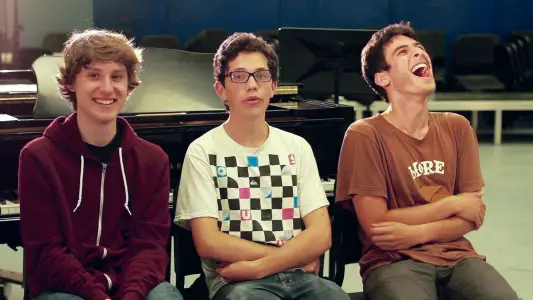
And that’s true creativity. You understand where the rules are, but you are going to break out of them. That’s where innovation comes from, that’s where big thoughts arise. That’s the realm of creativity, which is something that is not explainable. It’s this sort of paradox – you can’t really teach it, but that is where you learn it, in the arts class. It’s more like, the art classes when taught well (when the teacher is excellent) push the students to access parts of themselves they didn’t know existed.
FI: What is clear is that, for both the students and Mr Huls, this is more than just learning and repeating, it’s giving the students “life lessons” to be creative in themselves…
VBK: I was talking to a teacher the other day and I asked her, have any of the students broken out in music? Have they become accomplished? Some of the students have, and are, but then I realized that isn’t the point. The point is that this creativity can be used in any aspect of your life.
So if you’re going to be a doctor, or you’re going to be a scientist or you’re going to be architect or a business person, or go into technology. What you learn in that classroom is going to inform your ability to create and innovate, whichever discipline you choose.
FI: Obviously, as the director, you shape the way we see the students and the film itself, but within the documentary the students are very much given the platform to speak for themselves. There are many personal and emotional stories that come out in the interviews. Did you ever imagine you would have access to these extremely intimate moments?
VBK: Going into the film, my motivation was inspired by Mr Huls and what he was doing. I thought it would be really interesting to make him the centre of the film and the students to be like satellites. Mr Huls is the Earth and the students are like moons, orbiting him. As I was talking with the women in my producing team, they said ‘no, you’ve got to make it about the students. It’s all about the students’. I didn’t know about Amy [a student from the film], that was a surprise. I knew (vaguely) that Eloise and Spencer had a high school romance, but I’d never met them before so I didn’t know what it was.
I knew that Isaac and Brett were friends but I didn’t know the whole story. There’s a lot more to Isaac, there’s a lot more about some of them but you know – time restraints. What I really appreciated and enjoyed was the wisdom of the students and their willingness to be so open and candid. My blessing (and I suppose my curse) is that I’m not particularly judgemental. I appreciate people in all their different forms. I think diversity is neat, it’s something that really gives me joy. I think that they felt a full acceptance, and they didn’t feel judged.
I would always remind myself also to get out of the way at times because this film has almost nothing to do with me, in a sense. As a filmmaker, I really consider myself more of a channel. So I have this gift, who knows where it arrived from, but I have to use it.
FI: The students have so much to say, and are all incredibly articulate in doing so. They seem very comfortable and at ease speaking with you, do you think that’s a direct result of your non-judgemental approach to them?
VBK: Quickly, I just want to mention that Joan of Arc was seventeen years old… Think of Malala Yousafazi, she recently turned seventeen. There are some amazing young people who are amazingly insightful and they also have the advantage of not being weighed down by all of life’s experiences that might shut them down,
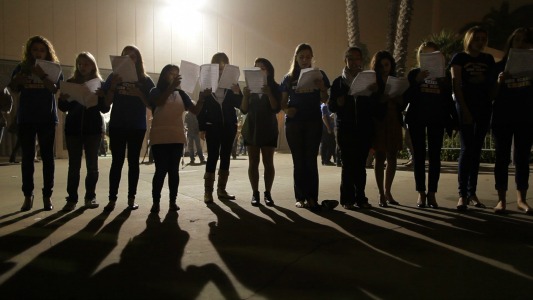
I feel like teenagers in the media are frequently depicted as being whiny or rebellious or breaking laws or doing drugs, highly sexualised, etc, They are part of our society, they are valued citizens.
FI: You mentioned that most of your production team was made up of women, which is unusual in the film industry. Sadly there is still a very uneven split in the industry, but there seem to be more women directing documentaries than ever before and a huge amount of diversity within the documentary subject areas. I wonder if you feel that there is a more even playing field for women going into documentary as opposed to narrative fiction film-making? What are your experiences as a woman in the documentary industry?
VBK: I work in both documentaries and narrative. I think in documentary, there are far less barriers to entry. You don’t need the kind of budget that a drama requires. You don’t have to deal with unions, you don’t need all the guilds. Nowadays you can pretty much pick up a camera and make a documentary. I think women have taken advantage of that, in a good way.
I also think perhaps it’s that women are motivated to tell meaningful stories that engage. For men, filmmaking can be a power-money kind of engagement. The power of being a director, the fame and the money may draw men more. You know – the war and the action. It’s hard and it’s like an extreme sport. Any kind of filmmaking is like an extreme sport, really.
I think women are more drawn to the meaning in their work. They are drawn to stories that matter, stories that tug at your or somehow contribute to you or transform. For me, I don’t know how people make films when they don’t have that because that passion is what keeps me going. I feel grateful that I can tell this story. That is what feeds me. I have to keep reminding myself about that part of it when the production gets really hard. I just remind myself that it’s not about me, it’s about the film and that is something I care about.
I think that the first thing more though – barriers to entry – and is probably the most important and relevant reason. Less gates and less gatekeepers to open them for you.
Big Voice is not just a story about a choir teacher wanting more for his students. Nor is it just a story about accessing that creative part of yourself. It’s a story about a community, about a bond between a group of young people made solely out of a love for the music. It’s wholesome and uplifting, and you should make every attempt to see this film.
Big Voice is currently on distribution with Gravitas, for updates on streaming and screenings check the Facebook page here.
Does content like this matter to you?
Become a Member and support film journalism. Unlock access to all of Film Inquiry`s great articles. Join a community of like-minded readers who are passionate about cinema - get access to our private members Network, give back to independent filmmakers, and more.
Becky spends her days working in TV and she spends every other minute writing about cinema, TV & feminism. Based in London, she also likes drinking gin, re-watching 'The X Files' and writing about on-screen representation and all manner of things over at femphile.com


